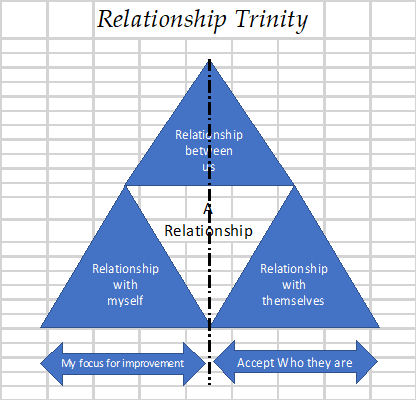Chapter 12 covers the importance and definition of a healthy relationship. Healthy relationships enhance us as well as others. These relationships prosper in a win-win environment. A healthy relationship requires both a need to be nurtured and a desire to nurture, as with the flower and the gardener. A healthy relationship does not define us but rather enhances the good within us. Not doing so is unhealthy.
It is important to define and objectively view what a relationship is and is not to facilitate making it better. It is wise to see that a relationship with another consists of three components. I call this view of relationships the Relationship Trinity. You will find that using this language will be most helpful in progressing your relationships. Wise, empowering language guides us toward healing and Betterism by facilitating progress and peace.

The Relationship Trinity recognizes that in a relationship with another, there are three components:
1. The relationship with myself, where my responsibility = 100%
2. The other person’s relationship with themselves, where my responsibility = 0%
3. The interactions between us, where my responsibility = 50%, with how I respond, react, and interact with them.
You may wish to take the following actions in each part of the Relationship Trinity.
1. Your relationship with yourself
• Develop and periodically review your 10 Convictions as detailed in Chapter 14. Strive to align your actions with your beliefs.
• Get your house in order – Identify opportunity areas for yourself for improvement and have a plan to make progress. Incorporate your plan into your Week in Review Session and Marvelous Start Morning Routine. This may be with your financial position, physical fitness, health, career development, or perhaps an ongoing resentment you harbor toward another.
• Work on your use of wise empowering language with both your communications as well as your thoughts.
• Remember that if you are hurting, angry, or frustrated, there will be a tendency for you to project that upset onto others, especially those who are close to you.
• Complete the “Who Am I” Worksheet.
2. Your relationship with the other
• Work on and hone your communication skills, especially with Relationship Listening, as discussed in Chapter 15.
• Work on understanding the other as with the Platinum Rule, “treat others as they wish to be treated.” Seek to understand their fears, desires, preferences, etc. See also the books “The Five Love Languages” by Gary Chapman and “The Platinum Rule” by Tony Alessandra and Michael J. O’Connor.
• Understand the Natural Order Of Things (NOOT) as per Chapter 5, that it was inevitable that people came to be as they are. Two important things to remember are that acceptance is not agreement, and what we resist will persist. Surrender to the reality of “what is” and learn to respond calmly and wisely. Surrendering to the laws of gravity is a good thing.
• The EBC Symbiotic 3 is an important concept with Empathy, Boundaries, and Consequences. Build your understanding of them and, in turn, your Empathy for them. Reread Chapter 7 of the “Journey into Peace” book regarding the EBC Symbiotic 3. Seek to understand how others feel about themselves. Are they at peace? Are they confident in their ability to handle adversity? Are they fearful of some potential upcoming action? Are they preoccupied with something?
• Complete the “Be the Archaeologist” Worksheet, seeking to best understand another.
3. The others’ relationship with themselves
If asked for advice, give it succinctly and with kindness, “Be the Waiter,” make your case and move on. Otherwise, let them be who they are. Continue to frame them in the larger context with their gifts, talents, and abilities. When you look at the sunshine, you don’t see the shadows. Remember that if you are caught up in their shortcomings, this may be more about your unhappiness and insecurities than their “unacceptable” imperfect behavior.
“Relationship Trinity” Worksheet
1. List concerns and potential actions for getting your personal house in order.
_______________________________________________________________________________________________________
_______________________________________________________________________________________________________
2. List concerns with how you interact and respond to the other in your relationship with them. What might you do better with how you listen to them?
_______________________________________________________________________________________________________
_______________________________________________________________________________________________________
3. List what you understand about the other and why accepting them for who they are is wise. Be careful to separate who they are from who you wish them to be. Where appropriate, list the Boundaries and Consequences you developed as per the EBC Symbiotic 3 Worksheet. Stay mindful to always be kind and respectful.
_______________________________________________________________________________________________________
_______________________________________________________________________________________________________
4. Referencing the “Journey into Peace Book”, answer the following question: “What is the difference between Resigned Acceptance and Objective Empowering Acceptance?
_______________________________________________________________________________________________________
_______________________________________________________________________________________________________
Remember to stay focused and committed to being a better you. Continue to improve your relationship with yourself and the world around you by accepting what is and improving how you respond to it.
After completing this worksheet (hopefully over weeks and not hours), you will be left with an important question:
“Am I OK with this person being who they are? Can I accept them for themselves and not expect them to change? Does the good outweigh the bad?”
If the answer to the above is “YES”, set boundaries and consequences with them.
If the answer is “NO”, set boundaries and consequences with them. Where appropriate and possible, consider limiting your interaction with them or cutting ties with them completely.
